

THE ACCOUNTANT

We’re an ACCA Platinum Approved Learning Provider, recognised for exceptional pass rates and support.
Study anytime, anywhere with our interactive Live Online lectures
Gain access to Kaplan resources, one of the world’s largest global education providers.

www.kpmglearningmalta.com Scan the QR code to learn more:
THE ACCOUNTANT ISSUE 3 | 2025
THE ACCOUNTANT magazine is issued quarterly.
Published by
EDITOR Maria Cauchi Delia
DESIGNER
Daniela Cutajar
ADVERTISING INQUIRIES theaccountant@miamalta.org
All correspondence, articles for publication and enquiries are to be addressed to:
The Editor MIA Professional Limited Level 1, Tower Business Centre Tower Street, Swatar BKR 4013, Malta.
The Institute does not necessarily concur with the views expressed by the authors in the articles published in this journal. The publishers and authors do not assume any responsibility for loss or damages incurred by any person acting or refraining from action as a result of any view expressed in this journal.
If you would like to be featured in this publication, please visit www.bit.ly/GetRecognised for more information.
4 President’s Address 6 Message from MIA CEO
8 MIA Diary
21 Aviation Cell Companies in Malta: A Strategic Innovation in Asset Management
25 An Evolving Environment: Where are we and where are we heading?
33 Malta’s New Audit Exemption Rules 2025
35 Advancing Customs Transformation: Malta’s Alignment with EU Reform
39 Local Appointments
40 Meet the Team
The Accountant can also be found online at www.miamalta.org/the-accountant

President’s Address Mark Bugeja
It is my pleasure to welcome you to another edition of The Accountant which is the last one of my Presidency. As I pen this final message, my thoughts run through the past two years as President of this Institute, and it is striking just how much has happened during this brief period of time.
This two-year term has been a period of intense activity, significant challenges and major accomplishments for the Institute. Above all, it has been an opportunity to ensure that our profession continues to contribute to the growth and resilience of Malta’s economy.
The past two years have been among the most challenging the profession has faced in recent memory. From global political uncertainty and conflicts affecting economic stability, to significant policy shifts in both the United States and the European Union (EU), the profession is living through one of the most transformational eras. Against this backdrop, the Institute has remained steadfast in its mission to support members, safeguard professional standards and ensure the accountancy profession remains relevant, responsive and proactive.
Digital transformation, anti-money laundering, taxation, talent and education, and sustainability have been at the centre of many conversations, consultations and events that brought together members, regulators and stakeholders. We have seen technology move from being a nice-to-have to an essential part of how accountants work. Through conferences, seminars and training, we have helped members explore new solutions and appreciate the value added that technology can offer, while discussing the practical challenges and opportunities that come with regulatory frameworks such as the Digital Operational Resilience Act. These conversations have encouraged firms to rethink processes, embrace innovation and approach technology strategically rather than just as a compliance requirement and must-do exercise.
In the fight against money laundering, our discussions have been equally active. With the European Anti-Money Laundering Authority taking shape, a single EU rulebook and a fresh National Risk Assessment on the horizon, we have been participating in consultations, providing feedback to regulators and hosting training sessions to ensure that members understand new expectations and can apply them in ways that make sense for Malta’s unique professional landscape. It has been about exchanging ideas, challenging overly complex requirements and finding practical ways to safeguard the financial system.
Corporate taxation has continued to spark debate and dialogue, given the consequential impact that this will have on Malta’s attractiveness. We have been in constant discussion with authorities, providing insight into how different rules connect and impact businesses, including within the wider Malta Financial Services Advisory Council umbrella. These conversations help ensure that Malta’s tax framework is not only compliant but also coherent, predictable and competitive.
Talent and education have also remained at the top on our agenda. The identification and retention of skilled professionals have long been a critical focus and one on which we have consistently shared our perspectives with the authorities. We also kept looking beyond the immediate needs. Through initiatives such as the #AccountsForYou campaign, school visits and partnerships with ACCA and the University of Malta, we have also invested in the future. We shared experiences, discussed career paths and explored how to attract and retain talent in a fast-changing market.
Sustainability has increasingly featured in our discussions, as companies and boards seek practical ways to embed Environmental, Social and Governance principles and navigate developments around the Corporate Sustainability Reporting
Directive, as well as evolving EU positions. Our role has been particularly relevant given how frequently the regulatory landscape has shifted.
While these priorities reflect much of our focus, they are only part of the picture. On the internal front, the Institute has revisited its strategy and continued to build upon and update the strategy that was set about five years ago. The revised strategy that was approved by Council last July will lead the Institute into the next three to five years. We believe that this review will strengthen governance, improve operational efficiency, ensure financial sustainability and will position the Institute to anticipate change, embrace opportunities and continue supporting members as the profession and Malta’s economy evolve.
Across all areas, being it regulatory, operational or educational, the MIA remains committed to guidance, advocacy and practical support. Our work touches a wide range of matters all of which affect not only the profession, but also the economy and the broader business environment, reinforcing the central role
of accountants in Malta’s growth and development. I am also very proud to have presided over several top-level conferences, including the hugely successful Biennial of this year.
As I conclude my term, I wish to extend my sincere gratitude to the Council, the CEO, our staff, committees and most importantly, our members. Your dedication and engagement have been central to every achievement. Together, we have strengthened governance, championed the profession and prepared the Institute for a future that is both challenging and full of opportunities.
The past two years have shown what is possible through vision, collaboration and commitment. I am confident that, with the continued support of our members, the MIA will continue to lead, innovate and provide guidance to ensure the profession remains strong, relevant and prepared for whatever lies ahead.
Thank you for your trust, support and commitment to excellence in our profession.


Message from MIA CEO Maria Cauchi Delia
Welcome to the third edition of The Accountant for this year, which brings a mix of features, interviews and news to keep you updated on developments across our profession.
At the onset, allow me to thank you once again for making this year’s Networking Event truly a memorable one. This event is growing in stature year on year, as hundreds of members, professionals and stakeholders join for an evening of food, drinks, music and networking. Once again, it also represented an opportunity to think about the vulnerable members of our society, as we raised funds on behalf of the Malta Trust Foundation.
This past summer has been exceptionally active for the Institute, as we addressed a wide range of issues, both local and international. Our approach is clear: we believe in being present, active and visible at key events and decision-making forums both locally and abroad, going beyond short-term interests to provide local perspectives, influence broader policy, standardssetting and professional debates. Being on the ground allows us to see first-hand what is happening, assess emerging challenges and ensure Malta’s accountancy profession remains relevant, credible and forwardlooking.
One of the most pressing challenges we continue to face is that of talent and resources. Naturally, we have been very active on this issue. Earlier this year, we submitted extensive feedback on the proposed Labour Migration Policy, calling for a sector-specific approach. The Institute insisted that policy must recognise the needs of sectors with high value-added potential, including accountancy and financial services. We emphasised the need for greater flexibility in hiring highly qualified individuals, cautioning against onesize-fits-all measures that could hinder growth. At the same time, local education needs to keep adapting to evolving industry requirements. For international professionals considering Malta as a base, we need
to showcase both the merits of the accountancy profession and the broader advantages Malta offers as a place to live and work. This requires a dual approach that combines career progression opportunities, competitive compensation, professional development and quality-of-life benefits.
To support our contribution in this area, we have carried out an extensive engagement survey to gain a clearer understanding of the challenges at hand. I must say that the conclusions drawn from the data mirror the perceptions we regularly encounter on the ground. However, having reliable evidence in hand allows us to plan our next steps with greater precision and confidence.
The shortage of qualified professionals affects not only individual firms and the wider profession but also the Institute itself. Internally, a relatively small team has been handling a substantial workload, and we simply cannot afford to let critical issues pass by unattended.
As the Institute seeks to enhance its relevance, we need the capacity to match the expectations placed upon us. Our work requires countless consultations, meetings and active participation in policy debates. It demands consistent input from our members and stakeholders, as well as constant engagement with authorities and regulators. Relevance does not come automatically. It must be earned through visibility, credibility and the ability to respond in a timely and meaningful way. For this reason, building and retaining the right resources is not just an operational necessity for the Institute. It is the very foundation on which our influence and effectiveness depend.
Taxation is another area where the Institute has invested significant energy. Corporate taxation lies at the heart of national competitiveness, influencing investment decisions and driving economic growth. Malta’s small, open, service-driven economy is especially vulnerable to international developments.
In this context, the Institute is working hard to bridge the gap between the authorities and our members. We bring both technical expertise and a broader strategic perspective to the table, helping to ensure that reforms are not only coherent and feasible but also aligned with wider priorities such as sustainable development. Speaking of the latter, we continue to monitor developments related to the Corporate Sustainability Reporting Directive as uncertainty remains in Brussels, Strasbourg and other European capitals.
These ideas and recommendations are also making their way in our proposals for Budget 2026 as well as in our feedback to the Vision 2050 proposal. In view of the upcoming budgetary exercise, we presented to Government and the Opposition an extensive set of proposals, focusing on enhancing Malta’s competitiveness through targeted sectoral investment, leveraging technology and AI, addressing skills shortages, reducing bureaucracy and decisive actions on key regulatory matters.
Over the past months, the Institute has been actively engaged across a wide range of initiatives that reflect both our role as the voice of the profession and our commitment to Malta’s wider competitiveness. We continued to be present at outreach events, including the I Choose Fair, which provided valuable opportunities to engage directly with students exploring their future careers. We took part in the World Finance Conference, contributing to a panel on Malta’s strategic direction in financial services.
Our summer agenda also featured discussions on the local Code of Ethics to ensure it remains aligned with international developments. In parallel, work is also progressing on our feedback to the European Financial Reporting Advisory Group consultation regarding simplified European Sustainability Reporting Standards.
Elevate your expertise with the latest CPEs
Check out our CPE Brochure to find out more
The audit exemption rules remain a major topic, as we continue to gather member feedback, preparing recommendations for the authorities and addressing the practical implications of these changes. A dedicated Continuing Professional Education session on the standard applicable for review engagements will be delivered in October. In addition, review engagements will be one of the focus areas during the Small and Medium Practitioners Conference coming up in October. Amongst others, this Conference will also focus on the strategic priorities shaping a rapidly changing environment, including the transition to realtime reporting.
On the training front, I would also like to remind you of two other highly relevant conferences being organised by the Institute this year. One of these conferences addresses matters of direct importance for professional accountants in business and senior leadership, particularly considering the growing trend of Chief Financial Officers moving into Chief Executive Officer positions. We will also be having our annual tax conference, during which we will be delving into key taxation areas that are critical for practitioners and businesses alike.
We also had the first meeting in the Meet the Regulator series where we hosted the Malta Business Registry, providing members with the opportunity to discuss with the Registrar of Companies directly and get first-hand updates on upcoming changes. Similar sessions with the Financial Intelligence Analysis Unit, the Malta Financial Services Authority and the Malta Tax and Customs Administration are lined up for the last quarter of 2025.
I look forward to meeting you at these events.
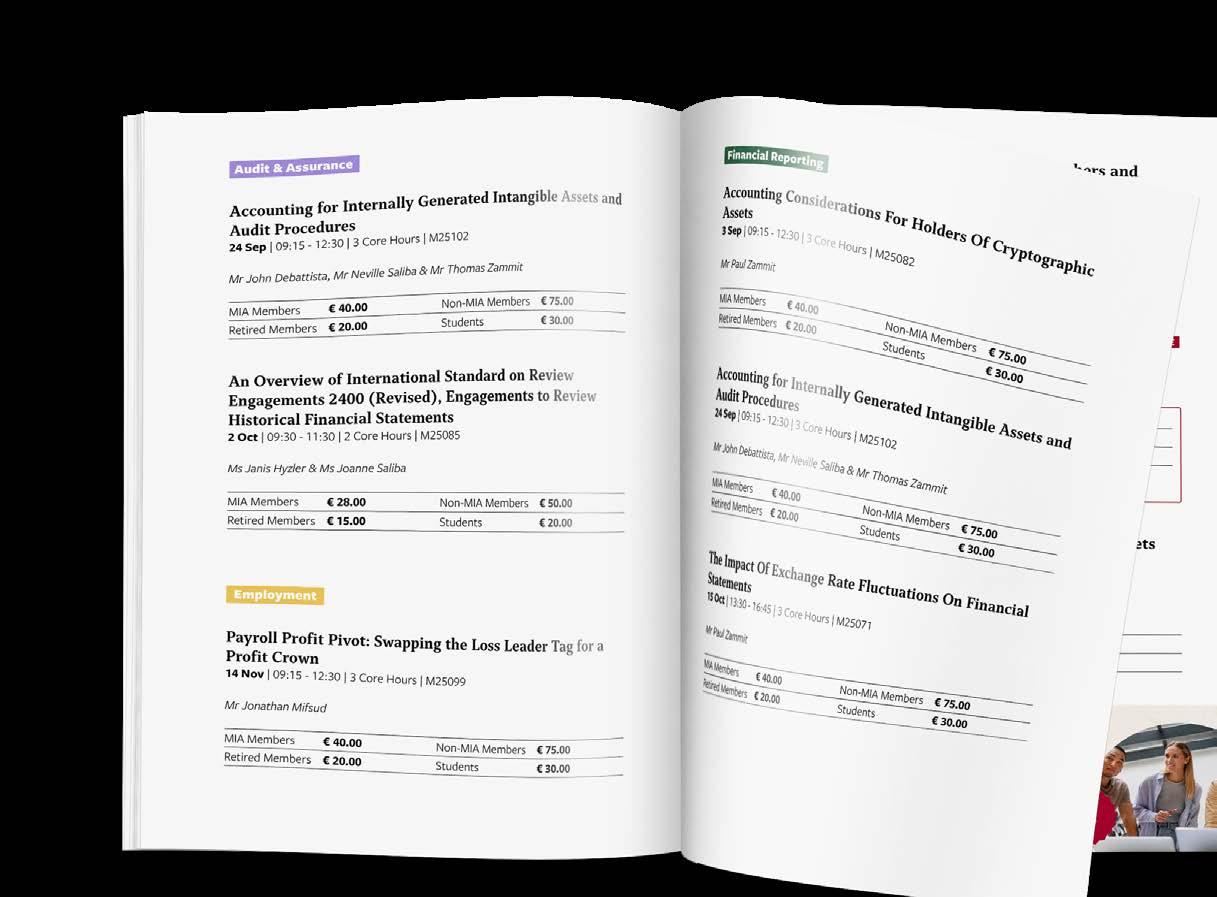
MIA diary
I Choose Fair
The Malta Institute of Accountants (MIA) actively participated in the I Choose Fair organised by the Ministry for Education, Youth and Research. This flagship event attracted a large number of students from across Malta and Gozo, many accompanied by parents, guardians or friends eager to explore postsecondary and career options.
The MIA, together with BDO Malta, Deloitte, Forvis Mazars, KPMG, PwC and RSM, joined forces to represent the accountancy profession at a collaborative exhibition stand. The collaboration with firms also showcased how the profession works together to maintain its high standards of excellence and to attract bright young minds to the field. This strong presence affirmed the profession’s relevance and underscored the wealth of opportunities it offers.
During the fair, the Institute’s Technical Manager, Amanda Zammit led a panel discussion about careers in Finance. During this session, active members of the Institute shared their first-hand experience of various opportunities offered by the profession in a number of niche areas.
This initiative formed part of the Institute’s ongoing commitment to inspiring the next generation of finance professionals and strengthening the talent pipeline for the Maltese economy.



The Malta Institute of Accountants participated in the panel discussion “Innovating Finance: Malta’s Strategic Vision” during the 2025 World Finance Conference hosted in Malta by the Faculty of Economics, Management and Accountancy at the University of Malta. Amanda Zammit, Technical Manager at
MIA, shared insights on the Institute’s contribution to the development of financial services in Malta, how the accountancy profession is preparing itself for a rapidly changing world, and the role of the Institute in supporting ethical integrity and continuous professional education.
The panel provided an opportunity to directly hear from Malta’s financial leadership on how the country is embracing innovation, responding to global trends and positioning itself for long-term success in an evolving financial environment.
2025 World Finance Conference Panel Discussion
Meet the Regulators Series
The Malta Institute of Accountants officially launched its Meet the Regulator series!
This new initiative gives professionals the opportunity to meet regulators directly, voice their concerns and seek clarifications on key matters affecting the profession.
The inaugural session featured an engaging discussion with Dr Geraldine Spiteri Lucas, Chief Executive Officer and Registrar of the Malta Business Registry (MBR).
Participants had the chance to raise their questions directly to Dr Spiteri Lucas, who shared important updates. The session also highlighted common challenges faced by both the MBR and industry professionals, outlining the importance of collaboration among stakeholders and continuous improvement.
Summer Lunch
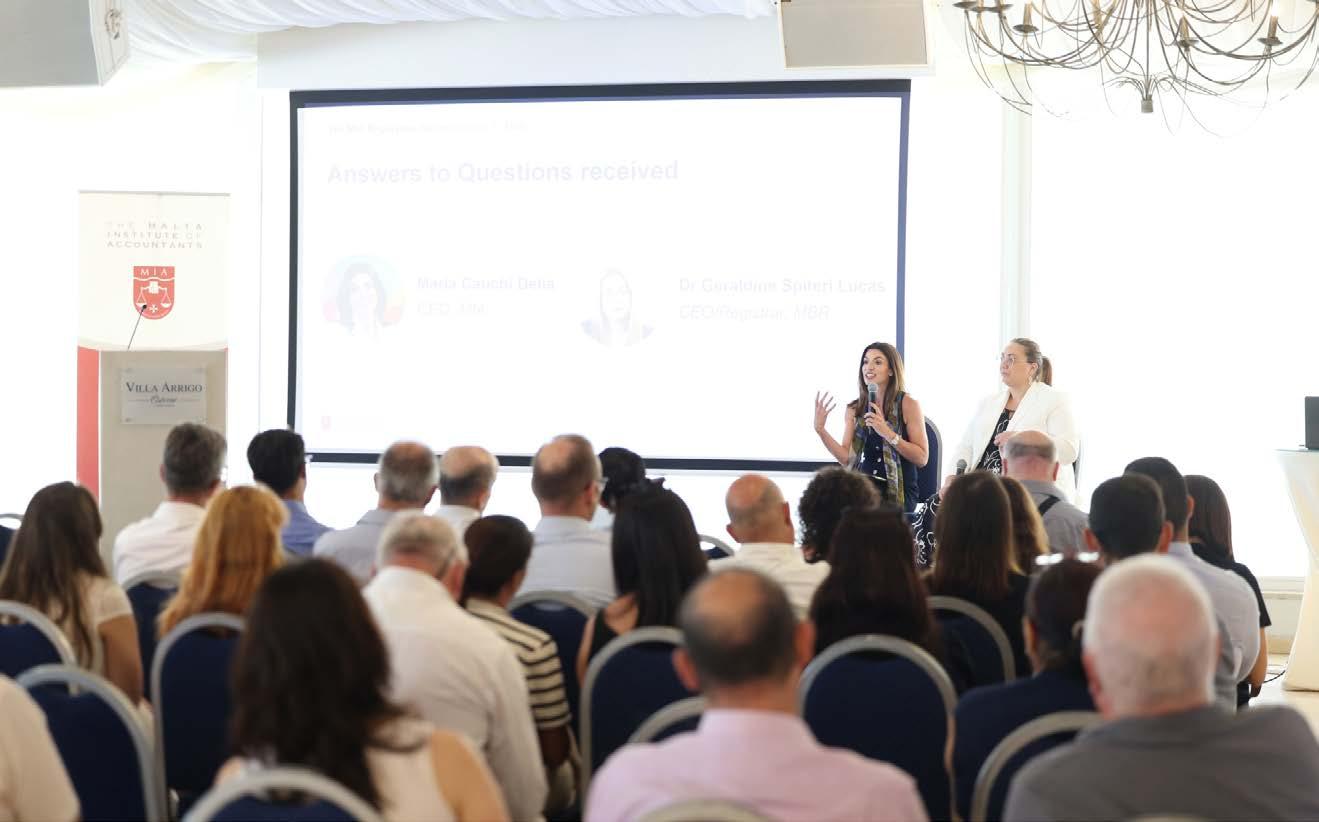
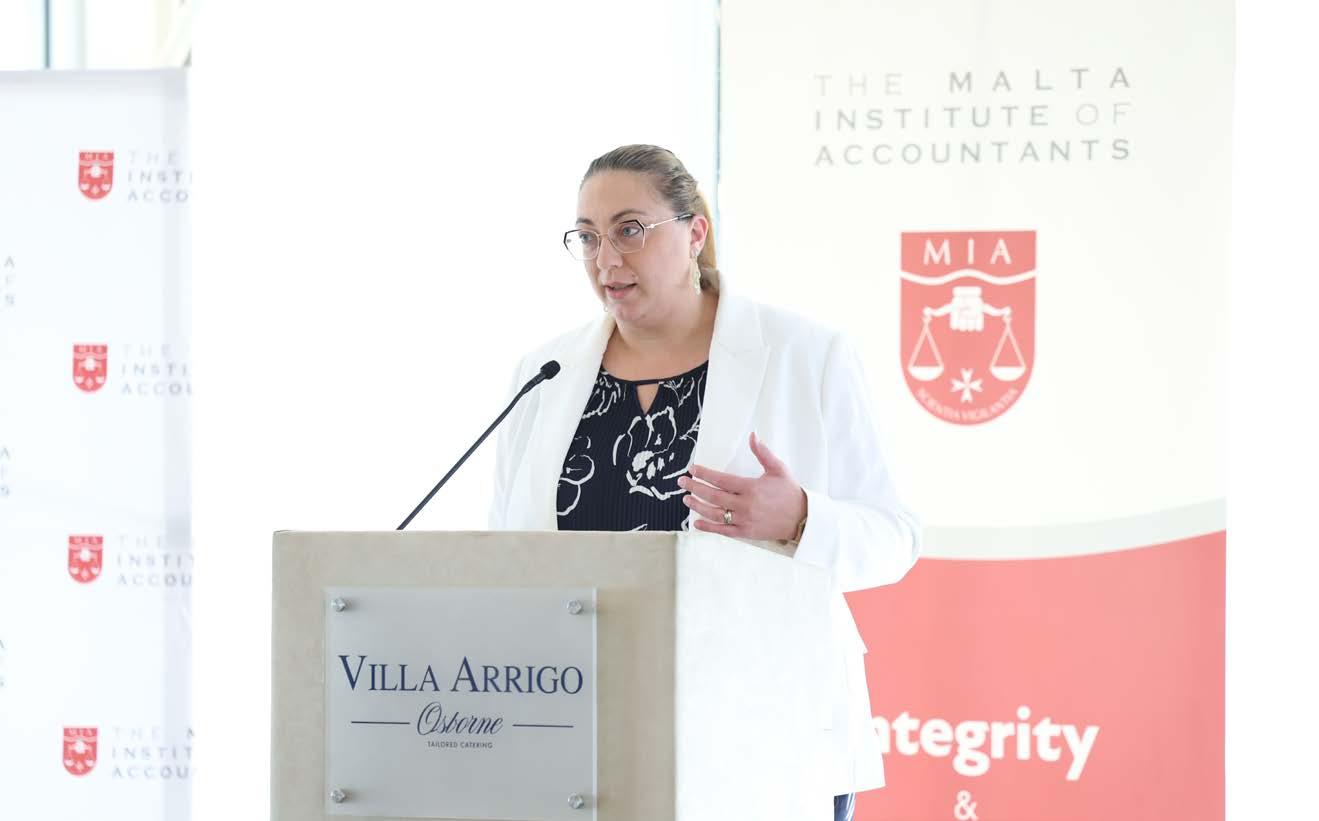
The Malta Institute of Accountants team came together for a Summer Lunch!
The MIA team gathered for a relaxed and enjoyable Summer Lunch - an opportunity to step away from the daily routine, strengthen connections and celebrate the dedication of the people who drive the Institute’s work forward.
Events like these are a reminder that behind every initiative, milestone and achievement is a hardworking and committed team. As the Institute looks ahead to an exciting new season, this gathering provided the perfect moment to reflect, recharge and refocus on delivering value to our members and the profession at large.

Malta climbs 50 spots in global investment rankings
Malta has achieved a major leap in global investment rankings, rising 50 spots to 33rd place in the 2025 Greenfield Foreign Direct Investment (FDI) Performance Index, as reported by fDi Intelligence. This makes the country the biggest gainer among all nations, underscoring its increasing appeal as a destination for FDI. The report suggests that Malta’s access to the European Union market continues to be a prime incentive among international investors, cementing the country’s status as a competitive and dynamic hub for global investment. Read here for more information.
CBM publishes economic forecasts 2025-2027
The Central Bank of Malta (CBM) has published its economic forecasts for 2025–2027, indicating that real Gross Domestic Product (GDP) growth is set to moderate from 5.9% in 2024 to 3.9% in 2025, easing further to 3.3% by 2027. Compared with previous projections, growth in 2025 has been revised slightly downward, while the outlook for the following years remains broadly unchanged. Private consumption is expected to remain the main driver of GDP growth, albeit at a slower pace, supported by a gradual recovery in investment. Net exports are projected to contribute positively through trade in services, though less significantly than domestic demand. The unemployment rate is expected to remain very low, while wage growth is projected to moderate in line with the ongoing disinflation process. Read here for more information.
Malta Receives €48.7 Million EU RRF Disbursement
The European Commission has released €48.7 million to Malta, marking the third payment under the Recovery and Resilience Facility (RRF). The funds support key reforms and investments, including measures to increase access to free public transport, promote sustainable mobility through electric vehicles, upgrade education infrastructure, enhance healthcare services, modernise the justice system and strengthen Malta’s anti-money laundering frameworkreinforcing the country’s commitment to financial integrity and compliance. With this disbursement, total RRF funds paid to Malta now stand at €215 million, representing 66% of the €328 million grant allocation under the plan. Read here for more information.
FIAU Launches Supervisory Plan 2025-2026
The Financial Intelligence Analysis Unit (FIAU) has launched its supervisory plan for 2025–2026, underlining its commitment to strengthening compliance monitoring by targeting high-risk sectors and key risk trends. This plan builds on the FIAU’s 2023–2026 strategy, which aims to ensure that supervisory initiatives focus not only on high-risk sectors and subject persons, but also on the most significant risk aspects identified through sectorial and subject persons’ assessments. Guidance and outreach efforts will be aligned with supervisory priorities, reinforcing the FIAU’s overarching goal of enhancing compliance culture and knowledge among subject persons. Read here for more information.
From
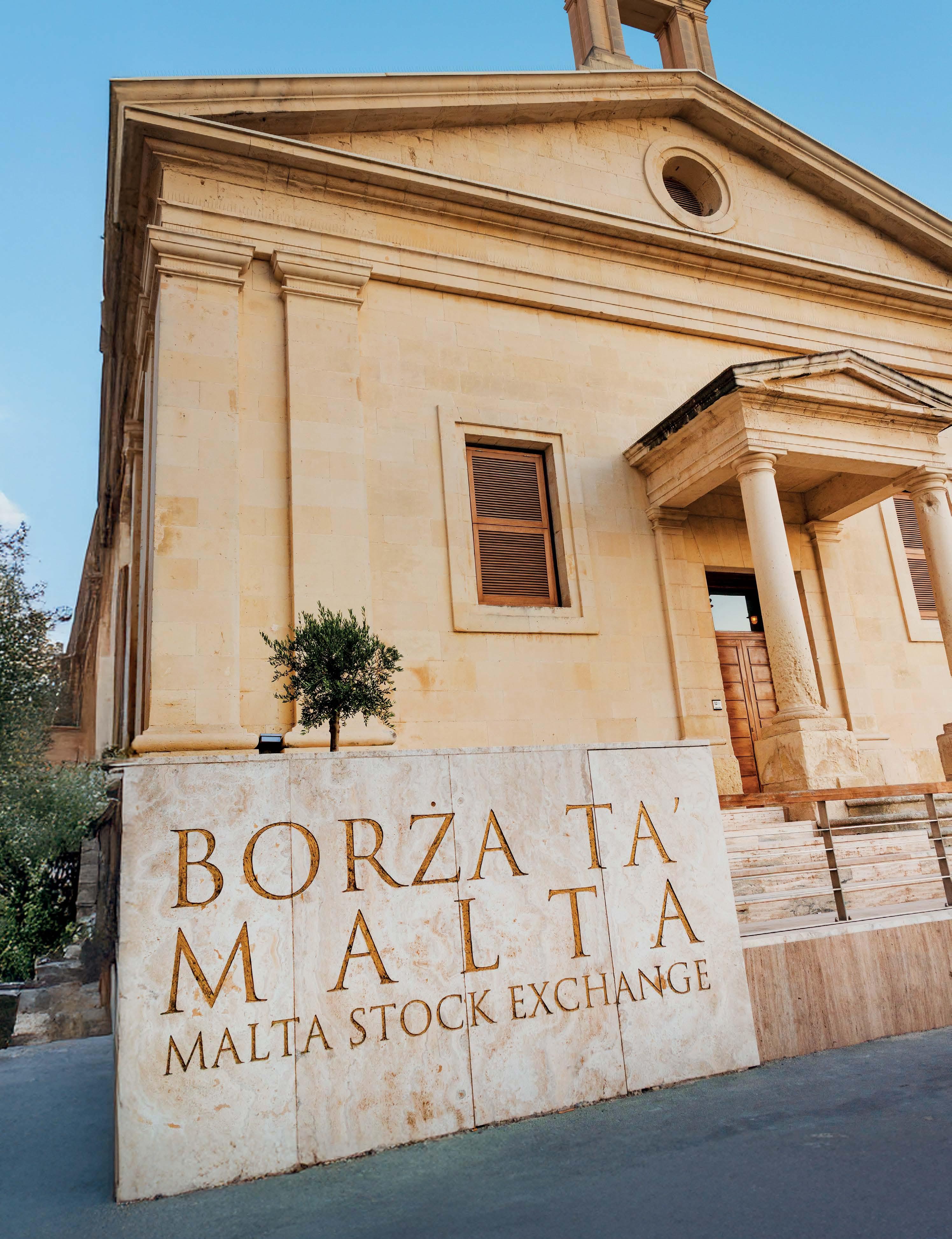
Turning capital ambitions into market reality requires more than a solid business case. It calls for experienced advisors who understand the full capital market journey, from structuring and compliance to building investor confidence.
As reporting accountants and corporate advisors on both the Prospects MTF and Main Market, Grant Thornton has built a reputation for rigour and results. With unmatched experience in bond structuring, listing preparation and regulatory navigation, we are the first call for companies and their advisors, who are ready to take the next step.
ADVISORY COMPLIANCE TRANSACTIONS REPORTING




Sustainability Corner
EUROPEAN COUNCIL POSITIONS
Negotiating position to simplify carbon border adjustment mechanism
The European Council adopted its negotiating position on one of the proposals of the ‘Omnibus I’ legislative package, aimed at simplifying the European Union’s (EU’s) carbon border adjustment mechanism as well as compliance costs for EU companies, especially small and medium enterprises. Read here for more information.
Sustainability reporting and due diligence requirements
Member states’ representatives agreed to the European Council’s negotiating mandate on simplifying sustainability reporting and due diligence requirements to boost the competitiveness of the Union. Simplification is aimed at the Corporate Sustainability Reporting Directive (CSRD) and Corporate Sustainability Due Diligence Directive (CS3D), and will be accomplished by reducing the reporting burden and limiting the trickle-down effect of obligations on smaller companies.
The Council mandate also postpones the CS3D’s transposition deadline to 26th July 2028.
The Presidency can enter negotiations with the European Parliament once the latter reaches its own negotiating position. Read here for more information.
Accountancy Europe’s hub on the Omnibus proposal
Accountancy Europe launched a page gathering all its contributions and resources on the Omnibus proposal since December 2024. These include factsheets, comment letters, public statements, consultation responses and Accountancy Europe’s views on the Omnibus ongoing discussions. Read here for more information.
Revisions to ESRSs by EFRAG
Following the Omnibus proposal of 26th February 2025 and the subsequent public call issued by the European Financial Reporting Advisory Group (EFRAG) for input on the revision of European Sustainability Reporting Standards (ESRSs) Set 1, Accountancy Europe submitted a series of recommendations to EFRAG. Accountancy Europe’s feedback focused on reducing the number of datapoints, clarifying provisions considered unclear, enhancing consistency with other EU legislation, providing clearer guidance on the application of the materiality principle, simplifying the structure and presentation of the standards, and strengthening interoperability with global sustainability reporting frameworks. The Malta Institute of Accountants (MIA) contributed to Accountancy Europe’s feedback and also submitted its own feedback to EFRAG in response to this consultation.
Building on the feedback received, EFRAG published the revised ESRS Exposure Drafts in July 2025 and launched a public consultation on these drafts. The MIA has since engaged in discussions with Accountancy Europe as well as the MIA Sustainable Finance Reporting Working Group falling under the remit of the MIA Sustainable Finance Committee on the revisions and will be submitting its own feedback directly to EFRAG.
ECB’s opinion on proposals for amendments to corporate sustainability reporting and due diligence requirements
The European Central Bank (ECB) delivered its opinion on certain corporate sustainability reporting and due diligence requirements, following the European Commission’s Omnibus proposals. The opinion was delivered with respect to the provisions falling within the ECB’s fields of competence, including the implementation of monetary policy, the prudential supervision of credit institutions, the contribution to the smooth conduct of policies pursued by competent authorities relating to the stability of the financial system and the collection of statistical information. Read here for more information.
IAASB
and IESBA: Answers to key questions on implementing ISSA 5000 and IESSA
The staffs of the International Auditing and Assurance Standards Board (IAASB) and the International Ethics Standards Board for Accountants (IESBA) released answers to the frequently asked questions (FAQs) to address practical queries relating to the International Standard on Sustainability Assurance (ISSA) 5000, General Requirements for Sustainability Assurance Engagements and the International Ethics Standards for Sustainability Assurance (IESSA). Specifically, the questions and answers address a number of areas including determining ethical requirements and group and value chain components, using the work of another practitioner, and addressing IESSA disclosure requirements in the assurance report. Read here for more information.
IAASB publishes new resources to support adoption and implementation of ISSA 5000
The IAASB published two resources to support the adoption and implementation of ISSA 5000.
These resources include extracts from ISSA 5000 for limited and reasonable assurance engagements and the FAQs document on International Standard on Assurance Engagement (ISAE) 3000 (Revised) and ISAE 3410. Read here for more information.
IESBA releases additional implementation support materials for IESSA
The IESBA published two implementation support publications aiming to assist sustainability assurance practitioners in the application of the IESSA. These releases include a document highlighting the differences between the IESSA and the corresponding provisions of the IESBA Code applicable to audits of financial statement, and a list of prohibitions in the IESSA applicable to sustainability assurance engagements of public interest entities. Read here for more information.
IASB’s revised Practice Statement on management commentary
The International Accounting Standards Board (IASB) issued a revised Practice Statement on management commentary. The commentary is a financial report that may include sustainabilityrelated financial disclosures whilst the revised Practice Statement provides guidance to help an entity present financial and sustainability-related information to create value and generate cash flows. Read here for more information.
Built Differently
Your bridge to bigger opportunities
We connect your talent with real growth; through hands-on experience, mentorship, and a clear path to progress.


Check out our open vacancies

The EU Pay Transparency Directive
We’re here to simplify compliance

From 7 June 2026, the EU Pay Transparency Directive will shift the paradigm regarding remuneration practices across the EU. It seeks to narrow the gender pay gap and ensure employees are paid according to the value their roles add. This focus on internal equity is a dramatic deviation from the primarily market-based approach to determining salary that has prevailed for decades. While reporting requirements vary, based on business size, all other provisions of the Directive apply to all employers. The Directive introduces compliance challenges, but also represents a cultural shift teeming with opportunity to enhance talent attraction, retention, and employee trust.
Conduct pay audits to identify and address gender wage gaps and outliers
Create and review job categorisation frameworks and pay structures
Conduct rigorous job evaluations to determine the relative value of each role
Inform, equip and upskill key personnel to ensure compliance in the long term
Prepare data and reporting templates to enable efficient compliance with transparency and reporting requirements
Review and align relevant HR practices, including performance management and your rewards and incentives strategy

EFRAG’s
video on the VSME digital template
EFRAG released a video on the use of the Voluntary Small and Medium Enterprises (VSME) Digital Template and the Template to the Extensible Business Reporting Language Converter to support the digitalisation of sustainability reporting for SMEs. Read here for more information.
IFRS FOUNDATION UPDATES
Educational material on IFRS S2
The IFRS Foundation published educational material about the requirements in the International Financial Reporting Standard (IFRS) S2 Climate-related Disclosures related to measurement and disclosure of greenhouse gas emissions.
IFRS S2 is effective for annual reporting periods beginning on or after 1st January 2024 with earlier application permitted as long as IFRS S1, General Requirements for Disclosure of Sustainability-related Financial Information is also applied. Read here for more information.
Educational material about using ISSB Industry-based Guidance
The IFRS Foundation published educational material aimed at helping companies understand the role of the International Sustainability Standards Board (ISSB) industry-based guidance when applying IFRS Sustainability Disclosure Standards. Read here for more information.
EFRAG 2025 State of Play portal
EFRAG launched the “EFRAG 2025 State of Play” portal, including insights from its latest market study on the early implementation of the ESRS under the CSRD. The platform provides access to the statistics dashboard and the report repository. Read here for more information.
Jurisdictional profiles
Thirty-six jurisdictions have adopted the ISSB Standards or are finalising their introduction into their regulatory frameworks.
The IFRS Foundation published a set of 17 jurisdictional profiles to provide transparency to capital markets. The profiles provide information about each jurisdiction’s target for alignment with ISSB Standards and the status of its sustainability-related disclosure requirements. Read here for more information.
Guidance on disclosures about transition plans
The IFRS Foundation published a new guidance document Disclosing information about an entity’s climate-related transition, including information about transition plans, in accordance with IFRS S2, aiming at supporting entities applying IFRS S2 Climaterelated Disclosures Read here for more information.
ESMA report on the Common Supervisory Action
The European Securities and Markets Authority (ESMA) released a report on the Common Supervisory Action carried out in 2023 and 2024 with National Competent Authorities (NCAs) on the integration of sustainability risks and disclosures in the investment management sector.
The findings reveal room for improvement of managers’ compliance with the framework when it comes to the integration of sustainability risks and disclosures, and will facilitate discussions between NCAs and market participants. Read here for more information.
ESMA thematic notes on clear, fair and not misleading sustainabilityrelated claims
ESMA released thematic notes addressing greenwashing risks in support of sustainable investments.
These notes are aimed at market participants and build on four principles, with the first note focusing on Environmental, Social and Governance credentials. Read here for more information.
European Parliament: Study of Reporting Obligations
The study of Reporting Obligations was commissioned by the European Parliament’s Policy Department for Justice, Civil Liberties and Institutional Affairs and provides a general review of regulatory reporting and disclosure overlaps faced by businesses in relation to the recently enacted CSRD, CS3D and EU Taxonomy, offering recommendations on how to relieve the burdens caused by these overlaps. Read here for more information.
European Commission presents voluntary sustainability reporting standard to ease burden on SMEs
The European Commission adopted a recommendation on voluntary sustainability reporting for SMEs. The voluntary standard included in the recommendation is intended to make it easier for SMEs that are not covered by the CSRD to respond to specific requests for sustainability information from large financial institutions and companies. Read here for more information.

The
Engineered for Excellence in Corporate Services
Your partner for keeping company registration information organised and up to date.
Digitised Company Registration Process.




Aviation Cell Companies in Malta A Strategic Innovation in Asset Management
Introduction
Over the recent years Malta has emerged as a strategic hub for aviation businesses, not only due to its geographic location and European Union (EU) membership, but also because of its innovative legal and corporate structures as well as its competitive tax regime. One of the most significant developments in the last few years is the introduction of aviation cell companies, a concept that has revolutionised how aviation assets and liabilities are managed. These companies operate under Malta’s Protected Cell Company structure which offers a unique legal framework, including a flexible, secure and tax-efficient solution for aviation stakeholders.
What Are Aviation Cell Companies?
Aviation cell companies in Malta are structured under the Companies Act (Shipping and Aviation Cell Companies) Regulations (Subsidiary Legislation 386.22), introduced in June 2020. These regulations allow for the creation of a single legal entity - a cell company - that can establish multiple independent “cells” within itself. Each cell operates as a distinct financial unit, with its own assets and liabilities, while still being governed by a unified board of directors and a single set of Memorandum and Articles of Association.
This structure is particularly advantageous in the aviation sector, where complex financial arrangements, such as aircraft leasing, financing and ownership, require robust risk management and asset segregation.
Formation and Operation
A company can either be incorporated as a cell company from the outset or converted into one, provided it meets the criteria outlined in the Companies Act, including delivering to the Registrar the company’s memorandum and articles of association for registration or a copy of the
resolution amending the company’s memorandum and articles of association, and the payment of the relevant fees. The company’s name must include the suffix Mobile Assets Protected Cell Company (MAPCC) to indicate its status. Each cell must be registered with the Malta Business Registry (MBR) and assigned a unique name. Directors must attribute specific assets to each cell within 40 days of conversion, and a formal notice must be submitted to the MBR within 14 days.
Key Features of Aviation Cell Companies
1. Segregation of Assets and Liabilities: Each cell within the company is legally ring-fenced. This means that the liabilities of one cell cannot affect the assets of another. This is crucial in aviation, where high-value assets like aircraft are often financed or leased under different terms.
2. Single Legal Entity, Multiple Operations: Despite having multiple cells, the company remains a single legal entity. This simplifies governance, licensing and regulatory compliance, while still allowing for operational flexibility.
3. Independent Accounting: Each cell must maintain separate accounting records. This ensures transparency and facilitates audits, especially when different investors or stakeholders are involved in different cells.
4. Tax Efficiency: Under Maltese income tax law, each cell is regarded as a distinct taxpayer. This structure offers flexibility for customised tax strategy, which can be particularly advantageous for international aviation businesses seeking to optimise their tax position.
5. Regulatory Oversight: The Malta Civil Aviation Directorate oversees aviation operations,
ensuring compliance with EU and international aviation standards. This adds a layer of credibility and security for investors and operators.
Ring-Fencing of Assets
A cornerstone of the aviation cell company structure in Malta is the ring-fencing of assets and liabilities. This legal mechanism ensures that each cell within the company operates as a financially independent unit. Assets allocated to a specific cell are protected from the liabilities of other cells and from the core itself. This is particularly valuable in the aviation sector, where high-value assets such as aircraft, engines or lease agreements must be insulated from external risks. For example, if one cell encounters financial difficulties or becomes subject to litigation, the assets and operations of other cells remain unaffected. This level of asset protection enhances investor confidence, facilitates structured financing, and supports complex ownership models, making Malta’s aviation cell companies a preferred vehicle for managing aviation portfolios.
Challenges and Considerations
While the MAPCC structure offers numerous advantages, there are also challenges to consider. These include:
• Complexity in Setup: Establishing and managing multiple cells require careful planning and legal expertise.
• Regulatory Compliance: Each cell must comply with aviation and corporate regulations, which can be resource intensive.
• Transparency Requirements: Third parties must be clearly informed when dealing with a specific cell, which requires meticulous documentation and communication.
Use Cases in Aviation
The flexibility of the MAPCC structure allows aviation businesses to tailor each cell to a specific function:
• Aircraft Ownership: A cell can be dedicated to owning a specific aircraft, isolating its financial and legal obligations.
• Leasing Operations: Another cell might handle leasing arrangements, managing contracts and payments independently.
• Financing: Separate cells can be used for financing arrangements, allowing for different lenders or investors to participate without crosscontamination of risk.
• Joint Ventures: Cells can be used to structure joint ventures with other aviation companies or investors, providing a clear legal and financial boundary.
Future Outlook
As the global aviation industry continues to evolve, Malta’s aviation cell company model is expected to gain further traction. The structure is particularly well-suited for:
• Aircraft leasing companies looking to isolate risk across different fleets or clients.
• Private equity firms investing in aviation assets.
• Airlines seeking to manage different operational units or joint ventures.
• Financiers and lessors who require legal certainty and asset protection.
Conclusion
Aviation cell companies in Malta represent a forward-thinking approach to managing aviation assets and liabilities. By combining legal innovation with regulatory rigor, Malta has positioned itself as a premier destination for aviation businesses seeking flexibility, security and efficiency. As the aviation sector becomes increasingly complex and globalised, the MAPCC structure offers a compelling solution for stakeholders across the value chain.
Whether for aircraft leasing, ownership or financing, Malta’s aviation cell company framework provides the tools to manage risk, optimise operations and unlock new opportunities in a dynamic industry.



Authors
Nicolai Borg Sant is a senior manager in PwC Malta’s tax department, advising a broad range of local and international clients, particularly within the aviation and shipping sectors. His expertise spans tax compliance, advisory services for corporate clients, and social security matters.
Mirko Rapa is a tax partner at PwC Malta and has been advising a diverse client base for over 23 years, with expertise in the aviation sector and assisting individuals relocating to Malta. He leads the firm’s corporate services unit, offering guidance on accounting and corporate matters.

Built on Integrity. Driven by Purpose.

At Forvis Mazars, integrity is at the heart of everything we do.
Guided by strong ethics, responsibility and accountability, we approach every engagement with independence and technical excellence. Our values shape how we serve clients, support our people and contribute to our communities. Grounded in trust and driven by purpose, we hold ourselves to the highest standards - today and into the future.
An Evolving Environment Where are we and where are we heading?
The subject under discussion looks deceptively simple, quite straightforward to address and develop. But it is very complex. It encompasses the primary policy issues that governments worldwide strive to address comprehensively. They often fail to reach all the stipulated goals and will be forced to make trade-offs.
The policy environment in Malta is “evolving.” It is not static. Whatever objectives are proposed must be attained within a constantly transforming background. Equally “evolving” are the “We,” the groups of people who define and assess the present, project the future vision and the means to materialise it, and implement the action programme as agreed. Both the ‘systems’ and the ‘agents’ are in motion.
To render the theme’s evaluation manageable, we approach it from four perspectives. Firstly, define ‘an evolving environment’. Secondly, spell out the ‘Vision’ (Where are we heading?) as expressed in official documents published by the European Commission and the Maltese government. Thirdly, examine who ‘We’ are in demographic and sectoral production terms. Fourthly, identify the set of policy tools with which Malta’s policy makers intend to attain the declared political, social and economic goals. These instruments include sectoral Regulatory Agencies.
1. An Evolving Environment
The term ‘environment’ may be restricted to the set of conditions prevailing before the introduction of, say, legislation on pension reform, and follow through the impact such a legal instrument may have on economic and social activity.
Or, interpret the term in a wider context by inserting into the analysis issues that are normally omitted. Take three examples to illustrate the ‘wider context’ of this ‘evolving environment’.
Climate Change
It is a topic discussed in terms of the impact envisaged climatic conditions may have on selected sectors of economic activity and related political and social spin-offs. Rising temperatures may displace tourist arrivals in the Maltese Islands away from the hot summer months. They will lead to higher consumption of water and energy and exert pressure on health resources and geriatric support services. They might even negatively affect the lucrative tuna farming trade.
However, climate change is conditioning not only the Mediterranean basin but also the Arctic Circle. Countries are already jockeying for a foothold in the Arctic with the intent of developing infrastructure to exploit the resource-rich territory after the ice melts. Canada, China, the Russian Federation and the United States of America (USA) are actively monitoring the situation and pushing for land control.
But there are also Member States in the European Union (EU) - Denmark, Sweden and Finland - and European Economic Area members - Iceland and Norway - with a foothold in the territory. And so, Malta, via the EU, has a direct interest in the future development of the Arctic region. That interest includes securing the terrain to ensure stability in extracting and processing materials and offering an array of services to finance and exchange the output.
Military Conflicts
Investors have been facing a global trade environment that is marked by active regional military conflicts. The impact these wars have on the supply chains and the demand for specific resources, like steel, gas and oil, comes immediately to mind.
But there are other considerations. One of these conflicts involves a superpower and a potential
EU member, namely, the Russian Federation and Ukraine. A decision will have to be made on Ukraine’s joining the EU. The answer will determine the EU’s configuration in terms of territory, population and economic output and consumption. These factors impinge on the EU’s position by market size and political influence in global fora and trade. Therefore, Malta has a direct interest in the outcome of this particular military conflict.
Artificial Intelligence (AI)
AI is hailed as the new industrial and social revolution of our times. AI will induce industrial synergies and redesigning of production processes over wide areas of activity. Such areas of industrial/ commercial specialisation within economic and political blocs can be ascertained and designed only after the size and composition of these groupings are registered.
So these ‘evolving environments’ are extensive, multidimensional and far-reaching. They demand a clarity of vision primarily concerning governance structures, identifying the relevant authorities empowered to design, discuss, implement and monitor what economic, social and financial programmes are deemed necessary for a group’s welfare. That will include, if necessary, the resetting of the political, economic and social structures already in place.
2. Where Are We Heading?
Theoretically, this should be the most difficult question to address. But recent documents published by the European Commission (Enrico Letta: ‘Much more than a Market: Speed, Security and Solidarity’, 2024; ‘The Single Market: Our European Home Market in an Uncertain World’, 2025) and the Maltese Government (‘Malta Vision 2050 - Strategic Targets 2035’, 2025) render the task easier by defining objectives and recommending means.
In short, the documents are the outcome of a reappraisal of the EU Single Market and the Economic and Monetary Union (EMU), and of Malta’s economic performance over several decades. Malta’s policy thrust targeting the annual rate of growth of total output will be replaced by ‘the total development of man’. In turn, the appraisal of the EU’s economic performance suggests that the bloc is not maximising the returns that a community of 500 million inhabitants is expected to yield. This ‘shortfall’ is
attributed to the failure to develop an effective Single Market. Instead, the initiatives taken led to the emergence of 27 single markets with a mindset of pushing for national rather than collective interests. Consequently, they failed as a group to benefit from specialisation, scale economies, lower unit labour costs and a competitive edge in international markets for the respective goods and services.
Policy makers in Malta have to match both visions: a revamped Single Market in the EU and a holistic economic and social development when faced by a declining and ageing native Maltese population. Even the EU is hit with a shrinking and ageing population, which, by itself, is calling for a re-appraisal of the relationship between national markets, innovation and economic growth. At the same time, the principle of a rules-based international system on which the EU has constructed its external relations and policies is being undermined by military and trade conflicts.
Three sectors that were deliberately kept outside the integration process, namely, finance, electronic communications and energy, are now being integrated to unlock the full potential of the Single Market. The market is judged to be complex, disjointed and weak. So it is proposed to render it Simple, Seamless and Strong. To construct a competitive structure, a fifth freedom will be added. To the free movement of people, goods, services and capital, add the freedom to enhance research, innovation and education.
‘Malta Vision 2050’ unites the existing sectoral strategies under one coherent, forward-looking national framework. “It broadens how we define success as a country. We are placing greater value on well-being, education, sustainability, innovation, inclusion and quality of life. ” “This vision is not about targets - it is about values, choices and collective action.”
These objectives are an offshoot of the Environmental, Social and Governance (ESG) considerations regarding investment decisions and companies’ performance already in place. ESG criteria may be defined narrowly, say, controlling energy consumption by households and firms. But ESG factors have a wider definition. They portray the role of a company not as private property owned by those who hold stocks - the shareholder model of the firm. The company is seen as a servant of a larger society - the stakeholder model of the firm.

In consultation meetings on ‘Malta Vision 2050’, these wider interpretations of values, empathy and governance have to be explicitly discussed, in conjunction with similar approaches being introduced in the EU. This is necessary to avoid misunderstanding in the debate, since stakeholders may be interpreting goals and policy measures in different ways.
It has to be recalled that societies switch the ranking of values as they climb the income and wealth ladder. It may be praiseworthy to have an empathic community, sensitive to environmental considerations, and fair dealings in trade and labour market exchanges. But as per capita income rises, people re-schedule their ‘values, choices and collective action’. They rank freedom and choice above solidarity. In these contexts, consumerism, debt-financed public sector expenditures on industry support and certain welfare measures will thrive. The ensuing mindset is not readily compatible with the values being proposed by ‘Malta Vision 2050’.
3. Who Are ‘We’?
‘We’ may be defined in demographic or economic terms. Each definition highlights specific policy considerations. Together they define the parameters, strengths and limitations for Malta’s future socioeconomic and political evolutionary paths in the coming years.
‘We’ in Population terms
For many years, the Maltese native population hovered around the 400,000 mark. Foreign nationals represented 3% of the total Maltese population in the year 2000. Development programmes were drawn up by Maltese for Maltese. The age and gender distribution of the total population underwent gradual transformation over time, but the nationality characteristic remained stable.
This will no longer be the case in the future. Malta’s native population is projected to fall from 405,000 in 2023 to 347,000 in 2050. This shrinkage arose primarily from the low birth rate, augmented at times by the net emigration of Maltese, mainly the young. Foreign nationals make up 28% of the population and account for 32% of the working-age pool (15-74 years). They are projected to represent 46% of the labour supply by 2035.
The social, cultural and economic implications of this rapid shift in the composition of the total population
are profound. It has to be seen whether Malta’s state can absorb and manage this demographic change. Whatever ‘Malta Vision 2050’ proposes today will have to be achieved and assessed by a completely different population structure ten years from today, let alone in 2050!
‘We’ in economic sectoral terms
The Maltese economy is service-based, like other mature economies in the EU. Recorded productivity growth in service-based economies is slower than in the manufacturing sector. Wages grow at smaller rates, if at all. As a result, labour income falls short of meeting demands for such services as housing. This could lead to a negative social divide and, eventually, social unrest.
Different countries approach this phenomenon in different ways. For example, the United Kingdom aims to ‘rebalance’ the structure of production by encouraging, through fiscal and non-monetary incentives, a revamped manufacturing sector utilising advanced technology, innovative capital and betterskilled labour resources. It still upholds the principle of free, multilateral trade; encourages private sector initiative while keeping control over strategic industrial and extractive operations.
The USA has lately resorted to aggressive trade policies, encouraging bilateral trade and relatively punitive tariffs coupled with tax exemptions for industries based in the USA. It seems to be aiming to redress a fiscal and external sector negative balance in one swoop. This approach created additional uncertainties in a market already marked by instability.
The Russian Federation went one step further. It defines what it deems as its ‘sphere of influence’ and expects neighbouring states to abide by this perception, which becomes an unwritten rule. This approach shakes the foundation of free trade and national sovereignty.
The EU lacks a coherent, all-binding approach to face this selective formulation of international trade by the big economies. Member States insist on carrying out lateral negotiations in addition to those being carried out by the Commission. At the same time, the Commission has to sell its views on a revamped market structure to Member States, the same states which may still be debating what the word ‘Union’ stands for!
This is one key issue which ‘Malta Vision 2050’ has to face and answer whatever queries related to it.
4. Policy Tools To Reach Objectives
Recent reports on the performance of the Maltese economy are positive when commenting on macroeconomic performance. The rates of growth of output, exports, employment, and overall inflation are deemed satisfactory. But these positive appraisals are generally followed by a series of admonitions regarding medium and long-term scenarios. Demographic change, the quality of labour supply, the effectiveness of the education and
health institutions, and the sustainability of the present pension scheme and the welfare of present and future retirees: there are more questions than answers referring to these issues.
They are meant to be addressed by ‘Malta Vision 2050’. But do policymakers have the tools to target such objectives? Malta is a member of the EMU. It adopted the euro on 1st January 2008 at a fixed rate of exchange of 1 Maltese Lira=2.33 euros. The EMU involves a single currency, a common monetary policy, and a coordinated economic and fiscal policy.
Maltese policymakers are constrained by the fixed rate of exchange with the euro, but have to fit within the rate of exchange of the euro with the other international currencies. Also determined to a wide degree is the leading interest rate indicator as influenced by the monetary policy measures taken by the European Central Bank (ECB) and other regulators, whose decisions influence administrative and compliance costs in the financial sector. That leaves the fiscal and labour market parameters to adapt and adjust given the rate of exchange and main interest rates, coupled with a seeming reluctance by local monetary authorities to follow the ECB decisions when interest rates are raised.
The fiscal regime went through a forward-looking reform in the Nineties. Income tax marginal rates were reduced from 65% to 35%, and a Value Added Tax and Capital Gains Tax were introduced. But the momentum to reconsider the rates every so often stalled. It may be timely to re-address this matter.
Above all, ensure fiscal fairness, accountability and sound governance. Underground activity has always been present in the local economy. In the long run, undeclared economic activities erode tax revenues, undermine legal businesses and distort market signals. It could get out of control. It does not align with the social fabric that ‘Malta Vision 2050’ is setting out to generate.
That leads us to the labour markets, wages, wage adjustment mechanisms, productivity, health and safety, and education. Recent surveys suggest disenchantment in labour markets. Workers consider their pay inadequate to meet an ever-rising cost of living, especially when referring to the property rental or purchase markets. They feel that their input is not appreciated by employers: situations which lead to labour turnover, continuous training of employees, stagnant productivity, and short-term
horizons for employees. At the same time, employers complain about the repetitive costs of training workers who do not feel attached to the firms that hire them.
In the context of a dwindling population, two data sets assume a paramount significance: an annual population register, which keeps close track of population movements; a constantly updated envisaged demand for labour, by skills, to ensure availability of personnel, but more importantly, to identify the kind of economic activity being generated. Low-skilled, low-income jobs induce heavy immigration, with rental sharing to split the cost and shift related social costs on the Maltese state and the taxpayer.

Author
These considerations point directly to governance issues. Regulators of the various economic sectors have fallen short in anticipating future capital and labour demands in the sectors they regulate. In some instances, they became a mirage of the organisation they would ideally be. They are seen as passive, box-ticking institutions with a dearth of databases in their possession. They are manned by a shortage of analytical skills, a fact which impairs their regulatory capabilities. At a time when the EU itself is being revamped, the international political and economic order is being challenged and possibly remade from the base, the last thing Malta wants is regulatory mirages!
‘Malta Vision 2050’ cannot be classified as a sterile document. It must be a meaningful guideline for a challenging future. That future depends largely on the capacity to listen.
E.P Delia held posts in academia, public sector institutions and private organisations. He has published extensively on macroeconomic issues, demographic topics and sectoral studies, with particular reference to Malta’s economy (Latest publication: Evaluating Malta’s Political Economy – 2017). He is a former director of the Central Bank of Malta, Chairman of Mid-Med Bank plc, and Chairman of APS Bank. He is the Chairman of Mercury plc and Amalgamated Investments SICAV.





Trusted partners of some of the greatest software from around the globe.






Malta’s New Audit Exemption Rules 2025
The Audit Exemption Rules, 2025 (Subsidiary Legislation [S.L.] 372.33), recently issued under the Income Tax Management Act, primarily aim to align tax obligations with those under the Companies Act (Cap. 386 of the Laws of Malta) and the Merchant Shipping (Shipping Organisations – Private Companies) Regulations (S.L. 234.42), thereby easing compliance obligations brought about by different laws with respect to audit requirements contained therein, while at the same time retaining assurances in relation to declarations made for tax purposes. Thus, these Rules specifically acknowledge audit exemptions granted under the Companies Act and the Merchant Shipping (Shipping Organisations – Private Companies) Regulations and also repeal the previously standalone Audit Report Waiver and Deduction Rules (S.L. 372.29), integrating them into a more comprehensive structure.
This article outlines the key provisions of the new Rules. These rules and related guidelines1 were issued following consultation with the Malta Institute of Accountants.
Audit Report Waiver
This provision, carried over from S.L. 372.29, allows newly registered companies to waive the auditor’s report requirement for their first two accounting periods. This waiver is applicable if the company’s sole shareholders are individuals with educational qualifications (MQF Level 3 or higher) who established the company within three years of the qualification date. The company’s annual turnover must not exceed €80,000 (or a pro-rata amount) to qualify.
This waiver is particularly beneficial for young professionals and start-up founders.
If an eligible company chooses to conduct an audit despite qualifying for the waiver, it may claim a 120% deduction of the audit cost. The deduction is capped at €700 per period, for its first two accounting periods. This provision was in effect prior to S.L. 372.29 and continues to remain applicable as is. This provides a financial incentive for new businesses to maintain a level of financial oversight.
It is crucial to note that both the audit report waiver and the option to deduct the audit cost are contingent on the ownership structure. In fact, these will cease to apply immediately if the requirements related to the educational qualifications are no longer met as a result of changes in the company’s shareholding.
Audit Exemption
Coming into effect, in principle, for accounting periods commencing on or after 1st January 2025, these new provisions aim to align tax audit requirements with the exemptions already available under the Companies Act for certain private companies. However, for companies registered in Malta under the Merchant Shipping Act, these Rules apply to accounting periods commencing on or after 1st January 2024.
If a company registered in Malta meets two out of three criteria listed under article 185 (2) of the Companies Act (related to balance sheet total, turnover and average number of employees) for two consecutive years, the statutory audit requirement for income tax purposes can now be satisfied by preparing a review report. This report must be prepared in accordance with International Standard on Review Engagements 2400 (ISRE 2400) (Revised)2 Engagements to Review Historical Financial
1 https://mtca.gov.mt/news-results-page/2025/07/25/audit-exemption-rules---guidelines
2 https://www.iaasb.org/_flysystem/azure-private/publications/files/International-Standard-on-Review-Engagements-2400-%28Revised%29-Engagements-to-Review-Historical-Financial-Statements.pdf
Statements and any subsequent amendments to that standard and related interpretations, issued or adopted by the International Auditing and Assurance Standards Board. ISRE 2400 (Revised) applies to limited assurance engagements, which provide a lower level of assurance than an audit.
If a company meets all three of the Companies Act criteria set out therein under article 185 (2) for two consecutive years, the statutory audit requirement is completely waived. This means no audit or review engagement is necessary for income tax purposes.
If a company registered in Malta is a parent company, such company shall not be treated as qualifying as a small company in relation to an accounting period, unless the group of which it is parent qualifies as a small group for two consecutive years. A group qualifies as a small
group in relation to an accounting period if its parent and subsidiary undertakings, when consolidated, do not exceed the limits of two of the three criteria set out in Article 185(5) of the Companies Act on the balance sheet date of the parent undertaking.
Similarly, the audit report requirements under the Income Tax Management Act are deemed discharged were the company registered under the Merchant Shipping Act benefits from the specific audit exemptions requirements provided within the Merchant Shipping regulations.
While these new provisions represent an important shift in audit requirements by offering simplification and greater flexibility, the Malta Tax and Customs Administration (MTCA) acknowledges the vital role played by the accountancy profession in navigating tax compliance obligations.

KEEPING PACE




Author This article was written by Gineve Schembri, Senior Manager (Legal, Technical, and International Relations) at the MTCA.
Advancing Customs Transformation Malta’s Alignment with EU Reform
Advancing Customs Transformation: Malta’s Alignment with EU Reform
Over the past year, the European Union (EU) has witnessed a significant acceleration in the modernisation of customs operations, driven by the ambitious implementation of new digital customs systems and far-reaching EU Customs Reform initiatives. At the forefront of this evolution, Malta has diligently maintained alignment with the overarching EU trajectory by introducing comprehensive system updates and procedural enhancements in full compliance with the Union Customs Code (UCC) and the evolving EU Customs Data Model (EUCDM). These reforms collectively represent a fundamental shift in how customs authorities manage cross-border trade, underpinned by digitalisation, increased interoperability and enhanced risk management.
The transformative journey for Malta’s Customs Department, within the Malta Tax and Customs Administration (MTCA), reflects a broader commitment to modernising tools, processes and legal frameworks, ultimately designed to better serve traders and support the EU’s Single Market integrity. This modernisation drive aligns with the EU’s vision of a fully digital, integrated customs environment, where data flows securely and seamlessly across borders and agencies.
Key Milestones in Malta’s Customs Department Reform Journey
Significant strides have been made over the past year in implementing the UCC provisions and upgrading national customs systems to meet new EU standards. These achievements include:
• Transition to New Computerised Transit System (NCTS) Phase 5: Malta’s customs transit system has successfully transitioned to the fifth phase of the NCTS, aligning fully with current EU requirements. This upgrade enhances the data structure, supports improved security risk analysis and strengthens interoperability with other Member States. The enhanced system facilitates smoother transit operations by enabling better real-time monitoring and control of goods moving through the customs territory, reducing delays and risks of fraud.
• Deployment of Arrival Notification, Presentation Notification and Temporary Storage Systems: Replacing the legacy manifest module, these new components provide a real-time, structured approach to managing the arrival and storage of goods. The system offers customs authorities greater visibility into the flow of goods, enabling more effective risk management and ensuring legal clarity on the status of consignments under temporary storage. This modernisation is critical to streamlining port and airport customs procedures while upholding security standards.
• Upgrade of the National Import System: Malta has fully aligned its National Import System with the EU Customs Data Model, ensuring standardised import declarations are consistent with those of all other Member States.
It is worth noting that various stakeholders were fully engaged throughout the preparation of these systems. This included thorough consultations with representatives of economic operators, provision of training and active involvement of traders during the testing phase.
Looking Ahead: Key Upcoming Initiatives
Building on these achievements, Malta’s Customs Department is driving further advancements through a number of projects. These include:
• Launch of the Automated Export System (AES) on 21st July - the AES has replaced the existing National Export System, aligning export procedures with UCC and EUCDM requirements. The AES enables automated handling of export declarations, improving accuracy, reducing processing times and facilitating compliance with EU trade rules. This system aims to enhance Malta’s export facilitation and support economic operators by making export transactions more transparent and efficient.
• Completion of the National Single Window (NSW): Expected by year-end, the NSW initiative aims to drastically reduce administrative burdens on traders by providing a unified digital interface for submitting all necessary information to various governmental authorities. This “single window” approach integrates multiple controls such as customs, veterinary and phytosanitary inspections, creating a one-stop shop for regulatory compliance and enabling faster clearance of goods.
EU-Wide Developments: Centralised Data and Authority
At the EU level, the European Commission’s Customs Reform proposal includes visionary steps to further centralise and modernise customs operations. The planned establishment of the EU Customs Data Hub will serve as a centralised, secure platform for standardised data exchange among Member States, enhancing transparency and enabling more effective risk assessment and enforcement activities. Complementing this, the creation of the EU Customs Authority, a decentralised agency, is designed to coordinate customs operations and standards across the Union, promoting uniformity and collaboration.
One of the reform’s cornerstones is a new compliance model based on data transparency and mutual trust. Under this model, highperforming economic operators can attain Trust & Check Trader status, allowing them to benefit
from simplified procedures, such as expedited release of goods and reduced physical inspections at borders. This approach fosters stronger partnerships between customs authorities and traders, emphasising compliance and efficiency.
Addressing E-Commerce Challenges
The explosive growth of e-commerce has transformed trade dynamics by increasing the volume of low-value consignments and associated compliance risks. To address these challenges, the European Commission is set to abolish the existing duty exemptions for low-value consignments, introducing a simplified tariff regime to ensure fair and consistent treatment of small parcels entering the Union.
The Import One-Stop Shop (IOSS) mechanism plays a pivotal role by facilitating Value Added Tax (VAT) collection at the point of sale for low-value goods, significantly simplifying procedures for distance sellers and expediting customs clearance. The upcoming reform will broaden the IOSS’s scope, extending coverage to additional consignments and goods categories, thereby enhancing VAT compliance and boosting transparency in e-commerce trade.
Conclusion: Embracing Change for Competitiveness and Security
Malta’s recent and forthcoming enhancements to its customs systems are an integral part of the broader EU-wide initiative to modernise and digitalise the customs union. As the UCC approaches full implementation and Customs Reform redefines operational frameworks, Malta’s commitment to adaptation and foresight will be key to sustaining its competitive edge.
For both economic operators and customs authorities, embracing these reforms is critical not only to ensure smoother trade facilitation but also to safeguard security, improving regulatory compliance and fostering mutual trust across the Union’s external borders. Malta’s proactive alignment with EU customs transformation exemplifies the nation’s dedication to a futureready, resilient customs environment that supports sustainable growth and integration within the global trading system.
This article was written by Alan Mamo, Director General (Customs Operations) within the MTCA.

Deadlines
October
• Value Added Tax (VAT) Return Period Ending August 2025 – Electronic Submission 22nd October 2025
• Recapitulative Statement Period Ending September 2025 – 15th October 2025*
• Central Electronic System of Payment Information (CESOP) Report for Quarter period ending September 2025 – 28th October 2025
• Final Settlement System Payer’s Monthly Payment Advice (FS5) for September 2025 – 31st October 2025
• Company Tax Return – Financial Year ending 30th November 2024 – Web Extension Deadline – 31st October 2025
• Directive on Administrative Cooperation (DAC 4)/Country-by-Country (CbC) Reporting by Ultimate Parent Entity/Surrogate Parent Entity –Group’s fiscal year ending 31st October 2025
November
• VAT Return Period Ending September 2025 –Electronic Submission 22nd November 2025
• Eco-Tax Quarter Period July 2025 to September 2025 – 15th November 2025
• Recapitulative Statement Period Ending October 2025 – 15th November 2025*
• FS5 Payer’s Monthly Payment Advice for October 2025 – 30th November 2025
• Company Tax Return – Financial Year ending 31st December 2024 – Web Extension Deadline – 29th November 2025
• DAC 4/CbC Reporting by Ultimate Parent Entity/ Surrogate Parent Entity – Group’s fiscal year ending 30th November 2025
December
• VAT Return Period Ending October 2025 –Electronic Submission 22nd December 2025
• Recapitulative Statement Period Ending November 2024 – 15th December 2025*
• Social Security Contributions (SSC) Self Employed (Class 2) payments – 21st December 2025
• FS5 Payer’s Monthly Payment Advice for November 2025 – 31st December 2025
• Provisional Tax Payments due for 21st December 2025 deadline
• Individual Non-filer declarations payments – 31st December 2025
• Part-time Employment (TA23) Payment of tax under-deducted from part-time work – 21st December 2025
• DAC 4/CbC Reporting by Ultimate Parent Entity/ Surrogate Parent Entity – Group’s fiscal year ending 31st December 2025
Other
*Recapitulative Statements are due on the 15th day of the following calendar month. Where the total quarterly amount (ex. VAT) is less than €50,000 the recapitulative statement is due by no later than the 15th day of the following calendar month. Nil Recapitulative Statements are not to be submitted.
Author
Local Appointments

BDO Malta has announced the appointment of Chris Scicluna as Group Chief Operating Officer and Executive Director with effect from July 2025.


PwC Malta has announced the appointment of Kirsten Cremona as Cyber Leader and Director of PwC Digital Services Malta Ltd with effect from 1st July 2025.

Zampa Partners has announced the appointment of Matthew Zampa as Managing Partner, Christabel Gatt as Chief Operating Officer, Janis Hyzler and Sarah Mercieca Gambin as Audit Directors, and Gergely Szabo as Group Director with effect from June 2025.

In the Driving Seat Steering Business with a Strategic Lens
As the lines between finance and strategy continue to blur, the transition from Chief Financial Officer (CFO) to Chief Executive Officer (CEO) has become more common - a reality Kenneth Abela, Deputy Chairperson of the Malta Institute of Accountants’ (MIA’s) Professional Accountants in Business (PAIB) Group and CEO Designate of AX Group, appreciates well.
“We are witnessing this more frequently - CFOs stepping into CEO roles,” Mr Abela says.
“It makes sense, because an accountant today offers a skill set that goes well beyond finance. But it is crucial that a business is not solely seen through a financial lens. The modern accountant’s role requires strategic thinking, cross-functional insight and a deep understanding of how different parts of a business connect, operate and align together.”
Mr Abela insists that accountants must adopt what he calls a ‘helicopter view’ to assure that the bigger picture is given more significance.
“While a business will naturally seek to deliver a profit, if that is all you focus on, you are missing the full picture. Decisions in business are not made just because the numbers say so. You need to understand your people, your clients, your market.”
His own career reflects that mindset. From an early stage, Mr Abela was involved at Board level, serving as company secretary alongside his finance related roles. That, he says, has given him a wider exposure to commercial, legal and operational considerations which have together shaped the way he views business leadership today.
“I was always keen to go beyond the finance role. Seeing different aspects of the business has given me a broader view and has helped me take better decisions. It is about connecting the dots.”

Mr Abela explained that that broad vision is vital at the helm of a group like AX, whose operations span over construction, hospitality, real estate & development, healthcare and renewable energy. This widespread portfolio allows us the opportunity to steer the conversation and address some of Malta’s competitiveness challenges.
“The local economy has been performing well, and most core sectors have grown considerably in recent years. However, a heightened and uncertain geopolitical environment currently shapes global dynamics, and our economy is not immune to these external factors. On a national scale, there are a few other challenges that have become the norm within every industry, particularly when it comes to recruitment and retention. We have known for a while that we need to move towards better quality. The best way to deliver a top-level experience must go hand in hand with a corresponding top-level national vision. The challenge of human resources keeps growing in all areas of the business.
The reality is that fewer locals are entering some sectors, and attracting talent from abroad is becoming more difficult and costly.”
While expressing concern about the sustainability of relying on foreign talent as a stop-gap solution,
he noted that “the challenge is to retain foreign workers for the long term through investing in training, introducing them to our culture and trying as much as possible to have clear career development paths that they attest to, which in turn, encourage them to stay for the long haul. As a nation, we need to address this boldly to make our country more appealing and welcoming to such people as without them most areas within our economy would collapse.”
On a broader level, Mr Abela reflects on Malta’s competitiveness - not just in tourism, but in its overall offering. “Malta is not cheap - and that may be fine as long as we make sure that we are delivering value. Major European cities are more expensive than Malta, however, they offer a complete experience. That is where we need to focus.”
Mr Abela believes that improving the quality of Malta’s product requires a collective and aligned approach. He argues that private firms are delivering on this promise, playing their part in raising standards. Companies such as the one he leads, have no margin of error especially in the hospitality division, with review platforms playing such an active role.
Naturally, this is not enough, as visitors also judge the country by its infrastructure - public transport, beaches, cleanliness, traffic and parking facilities.
“We are offering a good product, and most tourists leave our islands very satisfied and fulfilled. However, we need to ask ourselves: are we truly delivering on the promises we are making? Can we do better? Absolutely. This naturally applies to all sectors of the economy, whether it is health, financial services, gaming, construction and development, real estate, education, manufacturing and more.”
In this context, Mr Abela supports calls for a more sustainable kind of growth and links the value of sustainability with quality itself. The Group led by Mr Abela has been preparing for the obligations emanating from the Corporate Sustainability Reporting Directive in full swing.
“We are still waiting for a clearer direction on how things are going to work given the constant mixed messages coming from Europe, but that does not mean we should sit idle. Our programme is ongoing. We understand our role within the community and the impact our operations have. We want to be ready, not reactive.”
“As one of the founding members of the Malta Environmental, Social and Governance Alliance, we are committed to setting standards. We have invested in renewable energy and have significantly reduced singleuse plastics, paper, energy and water across all our operations. In addition, we invested in data collection procedures and systems.”
With the key role of the accountancy profession in sustainability reporting, this issue links back to one of Mr Abela’s central beliefs: that the accountancy profession is one of Malta’s most effective platforms for career development - if approached with the right mindset.
“Being an accountant does not mean you have to focus only on the traditional finance matters, and given the right attention, it can be a launchpad into something broader. If you take the time to understand all other aspects of business - legal, commercial, operationalthen your financial background becomes even more meaningful.”
Mr Abela’s commitment to long-term thinking extends beyond his corporate responsibilities. For the past five years, he has actively contributed to the Malta Institute of Accountants through its PAIB Group.
This Group is responsible for a number of key roles such as supporting Continuing Professional Education activities in several ways, including the organisation of an annual MIA conference that touches on the most relevant topics centring around the Professional Accountant in Business. Furthermore, the PAIB Group is also actively engaged in campaigns that are undertaken by the Institute to attract talent towards the profession.
“We need to show young people that accountancy is not a narrow, number-crunching path - it is a gateway into broader business leadership,” he says.
“The more we connect finance with strategy, people with purpose, the more the profession becomes a force for good.”
And with that, Mr Abela circles back to the values that have guided his own journey - drive, focus and a commitment to always seeing the bigger picture. “Let us not forget that companies exist to generate profit, to provide returns to shareholders, and this can only be optimised if all stakeholders are kept in mind, with the main focus being our customers. Profit must always be pursued and achieved ethically, responsibly and with opportunities for employees to grow.”
Meet the Team
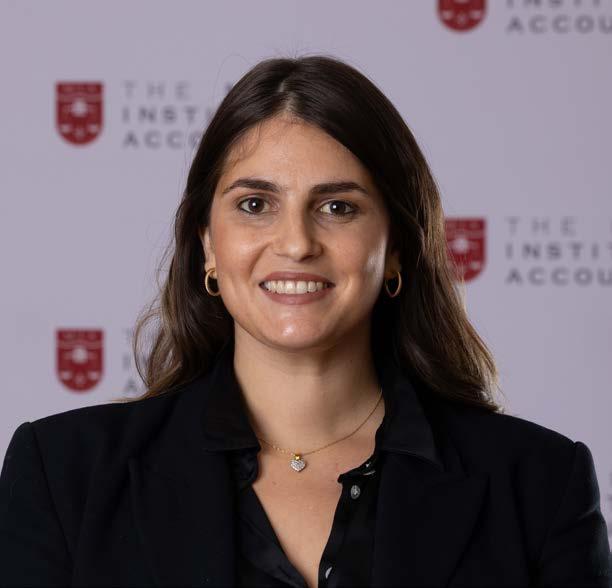
KRISTINA BUSUTTIL
What is something people are often surprised to learn about you?
People are usually surprised to find out I am a huge sports fan, especially of football and Formula 1. I support Liverpool and rarely miss a race during the weekend. My connection to Liverpool goes way back to the first memories I can recall of the period when my family moved to Liverpool before returning to Malta in 2000.
What is one thing you love about your current role at MIA?
I love how wide-ranging the role is. It allows me to contribute across various areas within the financial sector, provide legal advice and ultimately see the tangible results of all our hard work. There is something incredibly rewarding about being part of the full journey from input to impact.
What is your go-to coffee (or tea) order?
I am not much of a coffee or tea drinker. Funnily enough, even though I do not drink much of it, I love picking up unique coffee beans and flavoured teas whenever I travel; it has become a little tradition of mine. However, I have definitely been won over by matcha. Iced is my favourite, though there is something comforting about a warm matcha first thing in the morning.
If you could instantly master any skill, what would it be?
Saying the perfect thing immediately.
Early bird or night owl?
Definitely an early bird! The second the sun sets, my body starts to wind down. It is like a natural off switch.
What is one item you always have on your desk or in your bag?
A phone charger, always. Either my phone battery is dodgy, or I have emails coming in all the time (sometimes both), and I cannot stand being caught without a phone.
What was your first job ever?
My first job was at Subway. I had my first shift on the same day of my last O-level exam! I only worked there for one summer before moving into retail, but it was one of the best summers. The whole team was around the same age, and we had lots of fun.
What is a fun fact most people do not know about you?
I am terrified of small thrills, like riding a motorbike (even though I have conquered this fear during a recent trip to Thailand), but absolutely love big adrenaline rushes. I have been skydiving, and now I am on the hunt for the perfect spot to go bungee jumping!
If you could have dinner with any historical figure or celebrity, who would it be?
Robin Williams. I feel like it would be an unforgettable evening, listening to his stories, insights and all the ups and downs behind the humour. I imagine the conversation would be equal parts hilarious and deeply moving.
Do you prefer books, movies, or podcasts?
Definitely books. I love imagining the scenes in my own way, even if the characters in my head end up looking nothing like what is described. I just finished reading the Empyrean series by Rebecca Yarros, and if you have read it, you know what it is like to completely disappear into that world!
What is your guilty pleasure snack or treat?
A tub of Ben & Jerry’s with a side of sour candy. It is a weird combination, but it works.
Grow your Business with Calamatta Cuschieri
BUILDING LOCAL SUCCESS STORIES SINCE 1971

Unlock your company’s potential with Malta’s trusted leader in capital markets. At Calamatta Cuschieri, we deliver tailored solutions to help companies grow including bond listings, equity issuances, and structured placements.
Backed by decades of experience and a robust investor network, we ensure a seamless process, from strategic planning and precise structuring to obtaining regulatory approvals and effective market execution.
In the past 12 months alone, we’ve successfully raised over €575 million for our clients. Partner with us to accelerate your growth and achieve your goals.

